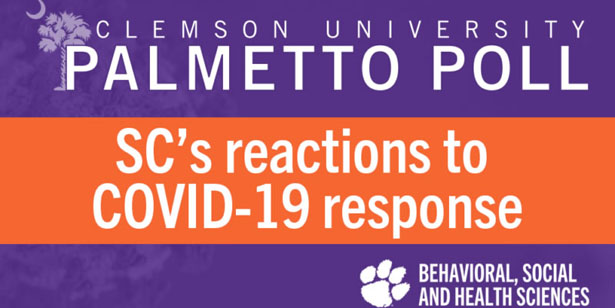Clemson public opinion poll reveals concern about COVID-19 response

CLEMSON — The Clemson University Palmetto Poll recently gathered data from South Carolina residents to gauge their concern regarding the COVID-19 pandemic as well as the state and national response to it.
Steven V. Miller, an associate professor in Clemson’s political science department who designed the survey, said that in addition to providing a general glimpse into residents’ concerns with the pandemic, the survey revealed major differences in attitudes toward government response along partisan, racial and ethnic lines.
Analyses of the poll’s results suggest just over 75 percent of South Carolinians are at least moderately concerned about the pandemic in their area, and almost half of South Carolinians are somewhat worried or extremely worried about getting sick with the virus. Further analyses from the poll found the following regarding South Carolinians’ attitudes toward COVID-19:
Black South Carolinians are particularly concerned relative to white respondents. An estimated 68 percent of black South Carolinians are extremely concerned about the COVID-19 outbreak whereas an estimated 27 percent of white South Carolinians are extremely concerned. An estimated 67 percent of black South Carolinians are somewhat or extremely worried about themselves getting sick with COVID-19 compared to an estimated 46 percent of white South Carolinians.
South Carolina Democrats are generally more concerned than South Carolina Republicans. An estimated 71 percent of South Carolina Democrats are somewhat or extremely worried they will become sick with COVID-19 compared to just 37 percent of South Carolina Republicans.
The biggest differences in attitudes in the poll concern the state and federal government’s respective responses to the COVID-19 pandemic and what the government should prioritize regarding the outbreak. The poll’s analyses also suggest:
South Carolinians are more dissatisfied than satisfied with the U.S. government’s response (52 percent to 40 percent).
South Carolinians are similarly as dissatisfied with the state government’s response (51 percent to 43 percent), though the differences are not as clear as attitudes about the federal government’s response.
South Carolinians are effectively split 50/50 on approving or disapproving on how President Donald Trump handled the early response to the pandemic. However, an estimated majority of South Carolinians (55 percent), think Trump acted too slowly.
South Carolinians are comparably as split on whether COVID-19 has had bigger effects on public health or the economy, but an overwhelming majority of South Carolinians want the government’s response to prioritize public health over the economy (63 percent to 26 percent) in dealing with the pandemic.
There is major partisan variation on these topics, according to Miller. Republicans were more satisfied than Democrats regarding the U.S. government’s response (68 percent to 6 percent), are more likely to approve of Trump’s handling of the COVID-19 outbreak (86 percent to 3 percent), and are less likely to think Trump acted too slowly (18 percent to 97 percent).
Miller said that Republicans in South Carolina put more weight on prioritizing the economy over public health (44 percent to 39 percent) than South Carolina Democrats, who almost unanimously prioritize public health in the government’s response over the economy.
The Palmetto Poll is housed within Clemson’s political science department and the College of Behavioral, Social and Health Sciences. The poll has contributed to the public dialogue among South Carolinians since 1999 by sharing information about the attitudes, behaviors and characteristics of the state’s voters.
While the poll has historically relied on traditional, phone-based polling methods, its latest survey employed social media responses to an online survey. Miller said that after removal of incomplete surveys and those that failed retention checks, the poll included 1,030 participants. The poll opened on April 21 and closed April 29.
The poll employed a statistical technique, known for shorthand as “MRP,” to minimize the effect of non-representativeness in an online sample in order to extract more reasonable estimates reported here. This technique of weighting survey results by known sociodemographic attributes of the population has been known to survey researchers for decades, but this method is becoming more prominent now. YouGov used this technique to much fanfare in forecasting recent UK elections. A group of researchers at Microsoft and Columbia University introduced the idea of political weights to successfully forecast the 2012 presidential election using online survey data.


























